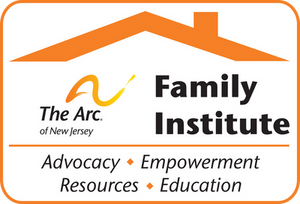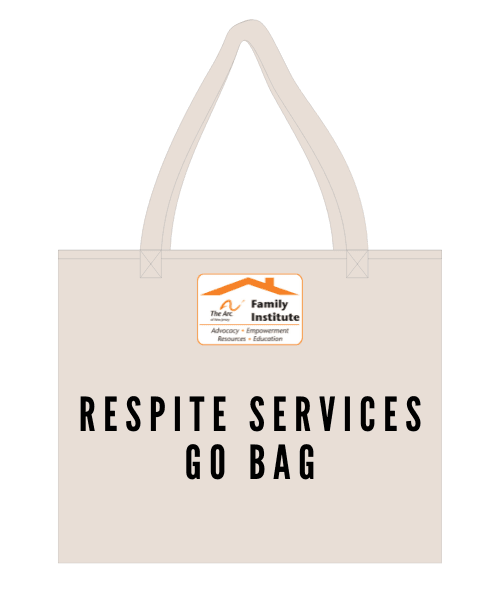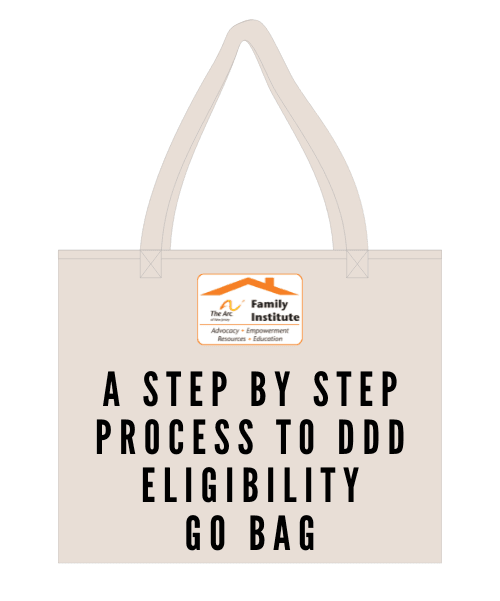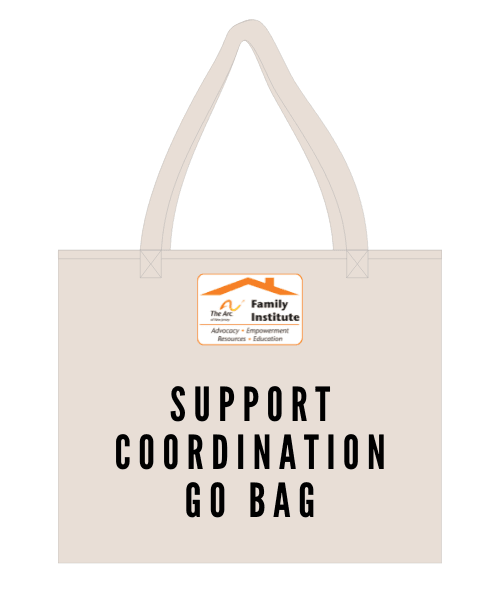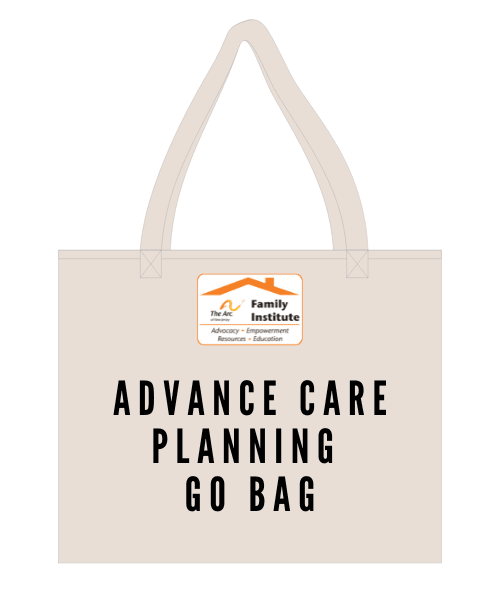
When planning for the future of a loved one with an intellectual and developmental disability, many parents and guardians think about establishing their own will and creating a special needs trust. However, planning for a loved one’s end of life isn’t often included in their plans.
End-of-life planning can include:
- Advance Health Care Directive
- End-Of-Life Housing
- Estate Planning
- Funeral Planning
- Obituary and Death Notice
Expressing Wishes for the Future
The Letter of Intent (LOI) outlines information on daily needs, supports, and legal and financial matters of a person with an intellectual or developmental disability (I/DD). The LOI should communicate the family and person’s intentions for the future. It serves as a good resource during times of transition.

Advance Health Care Directive
An Advance Health Care Directive, also called an Advance Directive, is a legal document stating how a person would like to be treated at the end of their life.
New Jersey has two kinds of Advance Directives:
- Proxy Directive (Durable Power of Attorney for Healthcare) - who can advocate for your care when you may not be able to.
- Instruction Directive (Living Will) - stating the types of medical treatments you do and do not want at the end of your life.
It is your decision whether to have either directives or just one of them.
For an individual that has a guardian:
- If a person with I/DD has a legal guardian, then that person will make all health care decisions, including all end-of-life decisions. However, guardians should plan ahead and have a secondary plan in place in the event of their passing.
For individuals without a guardian:
- An Advanced Directive should be established.
Advance Care Resources:
- The New Jersey Department of Health Advance Directive Forms and FAQs
- Advance Care Planning: Workbook and Video – A Guide for people with developmental disabilities and their families
Other Options:
Practitioner Orders for Life-Sustaining Treatment (POLST)
This form, signed by a patient's attending physician or advanced practice nurse, provides instructions for health care personnel to follow for a range of
life-prolonging interventions. This form becomes part of a patient's medical records, following the patient from one healthcare setting to another, including hospital, nursing home or hospice.
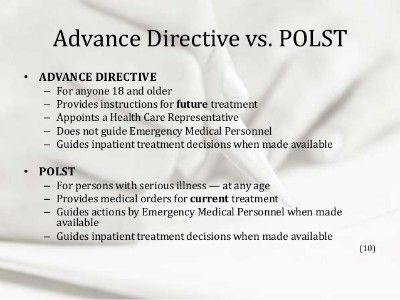
End-of-Life Housing
In general, the main difference in these housing options is the amount of care offered, both in terms of medical care and help with basic activities of daily life. The main housing options for end-of-life care are:
- Assisted living - Assisted living is a good housing option if you are able to manage your own care but need occasional help. Assisted living facilities have doctors and nurses on staff at all times in case of an emergency, and also help with activities of daily living, such as cooking, cleaning, and managing medications.
- In-home care - In-home care is a good housing option if you'd like to continue to live at home but need help with daily activities such as cooking, cleaning, toileting, bathing, dressing, eating, and managing medications. Most in-home care is non-medical, meaning those providing assistance are either professional caregivers or certified nursing assistants, rather than registered nurses or physicians. There are two main types of in-home care caregivers: (1) Home Care Aides - Home Care Aides are people who provide help with household duties. (2) Home Health Aides - Home Health Aides have received formal medical training and are usually certified nursing assistants. Home Health Aides may provide basic healthcare services.
- Nursing home, or skilled nursing - A nursing home is a housing option for those who need a high level of medical care. In addition to help with activities of daily living, nursing homes also have doctors or nurses on the premises at all times to care for residents and in case of an emergency.
- Hospice care - Hospice is an approach to end-of-life care that focuses on providing comfort and dignity to patients at the end of life. The goals of hospice are achieved through various efforts, including pain and symptom management, caring for the patient in the patient's home, and delivering care through a network of caregivers. Hospice is also very focused on the family of the patient, and offers emotional and psychological support to family members, both before and after the patient dies.
- Palliative care - This is an approach to medical care that focuses on relieving pain, stress, and other symptoms of illness. It's available to all seriously ill patients, whether the diagnosis is terminal or not. Many patients receive palliative care in conjunction with other types of care, such as dialysis, chemotherapy, or surgery.
Palliative Care vs. Hospice
Both palliative care and hospice focus on alleviating pain and other symptoms a patient may be experiencing. However, Hospice is solely dedicated to helping patients who are in the final months of life. Palliative care, on the other hand, is an approach available to all patients with treatable or terminal illnesses, no matter where they are in the life cycle.

Estate Planning
Writing a Will
A Will is a legal document that states who will receive your property when you die, who will oversee your estate (paying taxes, distributing assets), and, if you have children under 18 and/or adult dependent children, who will raise and care for them. If you don’t create one, the courts will make these decisions for you.
Resources:
Letter of Intent
A letter of intent is not a legal document, but it can be an important part of an estate plan. It is prepared by the parents or guardians of a child with a disability to summarize important information concerning the child, such as information regarding the child’s disability, health, doctors and programs, as well as the parents’ wishes and expectation for the future. This letter should be used as a guide for the successor guardians of the child with a disability and the trustees of the Special Needs Trust.
Create a Life Plan for your loved one with an intellectual and developmental disability
Legal documents alone won’t ensure quality of life. A will and a special needs trust will provide direction on legal issues and financial issues. They will not provide your child’s future caregivers with the detailed knowledge about your child that only you have. Take the time to document your child’s history, preferences, wishes and needs, so that people caring and advocating for him or her in the future will have something to work from. Other important information to include are pictures, organizations that can help with advocacy, and contact information for extended family, friends and professionals (support coordinator, case managers).
Funeral Planning
When planning a funeral or memorial service, there are many aspects of the service that you can plan and personalize, from your final resting place to readings and songs to participants.
Irrevocable Agreements
In New Jersey, irrevocable agreements are required when creating a prepaid funeral account for SSI/Medicaid applicants and recipients. Irrevocable means that the trust fund moneys are NOT REFUNDABLE. Only individuals prepaying their funerals in order to qualify for SSI, Medicaid, or General Assistance may establish irrevocable arrangements, which must be used for funeral and burial purposes. Irrevocable prepaid funeral agreements cannot, by law, be cancelled or refunded (although consumers may change funeral homes).
Public Assistance Funerals
The State of New Jersey can help a family in need pay for a funeral through the Department of Human Services (DHS). Apply for "public assistance" funeral funds by calling your county board of social services in the county in which the deceased resided at the time of their death.
Resources:

Obituary and Death Notice
Death notices are paid announcements in a newspaper that give the name of the person who died and details of the funeral service, as well as where donations can be made. Obituaries are articles written by a newspaper’s staff offering a detailed biography of the person who died.
Death notices and obituaries can have varying amounts of information; the information you include is entirely up to you.
